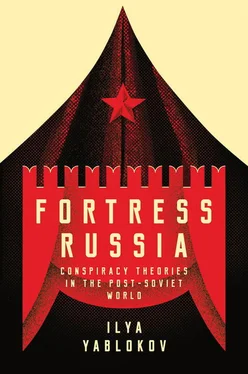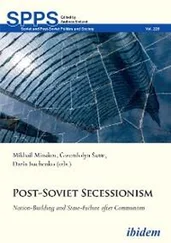A new campaign against NGOs carried out in 2012–13 eventually impacted on public perception, and established a conspiratorial image of third sector organizations in public discourse. According to a sociological poll conducted in May 2013 by the Levada-Centre , which continued functioning despite intimidating inspections and critical media coverage, 43 per cent of respondents considered influence on the domestic policies of Russia as the main aim of NGOs with foreign funding. Furthermore, 19 per cent perceived such NGOs as an internal threat to the country. Even though less than one fifth of respondents saw NGOs as clearly conspiring entities in Russia, almost half of them perceived third sector organizations as a problematic factor in domestic life. Hence attempts to delegitimize the Kremlin’s opponents by turning NGOs into the subversive Other could be assessed as moderately, but not fully, successful.
The prevalence of conspiratorial rhetoric in public discourse encouraged people to see a link between the term ‘foreign agent’ and the conspiratorial notion of the ‘fifth column’, thus effectively discrediting NGOs as spy agencies. Russian sociologist Denis Volkov noted at the time of the campaign that according to their research, approximately 60 per cent of Russians connected the terms ‘foreign agent’, ‘fifth column’ and ‘spy’. Fifty-six per cent believed that at least some non-governmental organizations were spying on behalf of foreign governments (Dymarskii, Larina and Volkov, 2013). As a result of the campaign, twenty-two organizations were subsequently declared by the law-enforcement organs to be ‘foreign agents’, and, as a rule, most of these organizations had a critical stance on the Kremlin’s domestic policies (Gorodetskaia, 2013). In sum, it has become evident that by 2013 anti-Western conspiracy theories turned out to be fully embedded in domestic politics.
The conspiratorial conceptualization of Russian NGOs, which was promoted in the public sphere from 2004 onwards, was one of the most significant, long-lasting ideological and political projects initiated by the Kremlin. Russian NGOs as political actors were important in fostering the values of a democratic society after the collapse of the Soviet Union. They provided people with assistance and filled the educational and social-support gaps left by the disappearance of the old system of state-sponsored social provision. Despite their relative weakness and inability to attract large numbers of activists, they were one of the main sources of civil education, and this is what enabled them to advance democratic values (Ljubownikow, Crotty and Rodgers, 2013). Moreover, despite the relative atomization of Russian society the population’s inclination towards cooperation and activism remain fairly high, especially in circumstances which are challenging for individuals (Greene, 2014). Therefore, the threat the Kremlin perceived in the colour revolutions made civil society institutions the first target for attack. As the case of Yukos demonstrated, the application of anti-Western conspiracy theories, together with the actions of law-enforcement agencies, could bring fruitful results. Accordingly, the campaign against NGOs was harsh and conspiratorial.
With the help of the state-aligned media and public intellectuals, conspiracy mythmaking became a key tool in the discursive construction of the negative image of Russian NGOs. As exemplified by the Yukos affair, conspiracy theories proved to be very useful in ruining the reputation of political enemies. The campaign that unfolded a few years later makes it clear that conspiratorial notions were used to help the Kremlin deprive independent civil society institutions of legitimacy and thus of the possibility of becoming important political actors which could challenge the Kremlin.
The campaigns against NGOs, promoted by the media and shaped by conspiracy theories, served to justify legislative changes and, at the same time, to explain these changes to the public. These measures caused a two-fold decrease in the number of NGOs, from approximately 400,000 in 2005 to less than 227,000 in 2016 (TASS, 2016). Given the absence of effective government support for social and humanitarian initiatives, this drop in the number of NGOs had an adverse influence on the development of civil society in Russia. The allegation against NGOs that they lacked loyalty to the Russian nation paved the way for the government to create from above supposedly civil society actors who were in fact fully loyal to the Kremlin (Biriukova and Zheleznova, 2013).
The process of othering NGOs, carried out by public intellectuals and politicians through anti-Western conspiracy discourse, was primarily aimed at ensuring that civic organizations were perceived negatively by the majority of Russians. In fact, political elites were concerned that they themselves could lose legitimacy because of the activities of NGOs, and this further encouraged the use of anti-Western conspiracy theories as an important instrument of political practice. The significant increase in conspiracy fears about NGOs during Putin’s second and third presidential terms allows us to trace both the evolution of the anti-Western conspiracy discourse and the continuity of methods which were used in solving domestic political issues.
The campaign against NGOs in 2005–6 was carried out by a few highly influential media outlets, and it began to shape public opinion regarding the work of NGOs. It was not difficult for the Kremlin to create a conspiratorial image among ordinary Russians of NGOs as a ‘fifth column’ because both knowledge about and interest in their activities were relatively low. However, the unstable political situation in the aftermath of the presidential elections in March 2012 significantly radicalized the official political discourse. The dramatic decrease in public support for the government forced pro-Kremlin politicians and intellectuals to use all available discursive tools to ensure social cohesion and public support of the regime. An image of NGOs as the dangerous conspiring Other had already been established; the subsequent escalation of the Kremlin-led campaign against NGOs can be seen as a straightforward way to suppress one of the few noticeable opponents of the regime. The crisis in Ukraine, discussed in Chapter 7, would bring another wave of repressions.
6
Shadows of the Revolution
The shadow of 1917 hangs over Putin and his elites. In 2017, a hundred years after the revolution, there is no indication that any official ceremonies will be held to commemorate the event that shook the world and changed the country forever. Instead, after eighteen years of the Putin presidency, the establishment has become accustomed to looking for signs of an insurgency which could end his regime, in the same way that the regime of Emperor Nicholas II collapsed in 1917. The state-aligned media keep on airing programmes about the Western spies who destroyed the great Imperial state from within, making pointed references to the current global state of affairs (Zygar, 2017).
The gradual insulation of the country from foreign influence, and its development into a ‘fortress’ (at least on the level of political rhetoric), began under the pretext of preventing revolution from being ‘imported’ into Russia from the West. The first regime changes in the CIS countries in the mid 2000s met with great concern in Moscow. They disrupted existing relations between the political elites of the former Soviet republics and, in the eyes of the Kremlin leaders, posed a serious challenge to the smooth transfer of power during the 2007–8 Russian elections. Russia’s power brokers did not want to violate the constitution, which would raise questions about their right to rule; instead they used all the tools available to them to redesign the political system in such a way that Vladimir Putin could legitimately remain in power. Elections have been key to this process.
Читать дальше
Конец ознакомительного отрывка
Купить книгу












